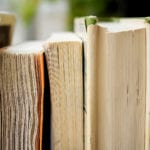On My Shelf helps you get to know various writers through a behind-the-scenes glimpse into their lives as readers.
I asked Carl Trueman—professor of biblical and religious studies at Grove City College in Pennsylvania and author of The Rise and Triumph of the Modern Self: Cultural Amnesia, Expressive Individualism, and the Road to Sexual Revolution—about what’s on his nightstand, his favorite fiction, influential biographies, and more.
What’s on your nightstand right now?
I am reading Dostoevsky’s The Brothers Karamazov. I teach a course at Grove City every couple of years on theism and atheism in the 19th century, and next year we will be using “The Grand Inquisitor” as one of the texts. As Brothers is the one of the “big four” Dostoevsky novels I had not read, I thought I better do so. And I am thoroughly enjoying it.
I am also reading Timothy Brennan’s Places of Mind, his biography of Edward Said. I have always been fascinated by intellectuals who do not quite fit into the world in which they find themselves. I read a huge amount of Said in my 30s and 40s and would still rank his Culture and Imperialism as one of the most interesting books I have encountered. Politically and theoretically, I am far distant from him, but he remains a useful foil and an intriguing, at times perhaps sinister, polymathic figure. Brennan’s work is a fine analysis of his thought via his biography.
I also always try to read things that enhance my classroom teaching and my writing, and, as I’m starting to work on a book on the origins of critical theory, I’ve recently picked up Siegfried Kracauer’s From Caligari to Hitler. Kracauer was loosely associated with the early Frankfurt School, and this work is his analysis of how German films of the early 20th century connected to the psychological conditions that facilitated the rise of Hitler.
What is your favorite fiction?
Too many to list, but here’s an attempt: Emily Brontë, Wuthering Heights. Flann O’Brien’s The Third Policeman is (to me) one of the funniest and cleverest books ever written. I love Thomas Hardy’s novels, offering as they do profound reflections on the eclipse of English rural life by the rise of cities in the 19th century. And they are set in the West Country, the place where I grew up and where I feel I belong.
Barry Hines, A Kestrel for a Knave, might be my all-time favorite modern novel, the story of a boy from a poor, broken family in the north of England who comes alive when he trains a kestrel. The last chapter is, for me, perhaps the most heartbreaking passage ever penned in the English language. And for fun, I love crime fiction, Raymond Chandler, Ruth Rendell, and Ian Rankin especially.
What are some books you regularly re-read and why?
I reread Wuthering Heights every few years. It is a dark, brooding study of obsession, of the close connection between love and hate. And Brontë captures so beautifully the sublime power of nature. I am a country boy by upbringing and a Romantic by inclination, and Brontë allows me to indulge myself. I also love William Blake, Songs of Innocence and Experience, and A. E. Houseman, A Shropshire Lad.
I have a copy of both on the cabinet next to my chair in the sun room. I love Houseman in particular. I was first introduced to him via the English master at my school—“Chas” Campbell—who had that rare gift of inspiring teenage boys to love literature. I regularly quote “The Welsh Marches” and “XL” in class. Like nobody else he captures something of the compounding sense of loss that growing older involves.
What books have most profoundly shaped you as an historian?
Roland Bainton’s Here I Stand is the book that inspired me to become a Reformation historian. I will always have a deep and grateful affection for that volume. In my years as an undergraduate, P. A. Brunt’s Social Conflicts in the Roman Republic was the book that first helped me understand what history as a discipline was doing. Peter Brown’s Augustine of Hippo was also very influential on me for the way he deftly blended social and intellectual history. Quentin Skinner’s essay “Meaning and Understanding in the History of Ideas” was profoundly important for me in clarifying (and making me more self-conscious about) my historical method, as was Richard Muller’s God, Creation, and Providence in the Thought of Jacob Arminius.
What’s one book you wish every pastor read?
Only one? That is hard. So let me recommend two while pretending only to choose one. Martyn Lloyd-Jones, Preaching and Preachers. It is part wisdom, part complete mystical madness, all fascinating. Lots of great anecdotes, and any book that uses the word “abomination” with such ease has to be worth reading. But (along with P. T. Forsyth’s Positive Preaching and the Modern Mind) this is a book that conveys the romance and excitement that should characterize the act of preaching (and, indeed, of hearing preaching).
What are you learning about life and following Jesus?
Life is short. Now in my mid-50s I am increasingly conscious that time is limited and that as a Christian I need to be very careful about my personal and professional priorities. Private time with family and close friends means so much to me these days. An evening in the company of loved ones is a precious gift that I have too seldom appreciated in the past. And professional time has to be focused on things that count: the classroom, reading things that matter, writing articles and books on topics of serious moment.
I am amazed at how many Christians spend their days on Twitter and Facebook—too often platforms for ephemeral trivia and unpleasantness. I do not believe Jesus wants me to use my remaining years in exchanging insults with other Christians. I think he wants all his people to witness to the world by using the time and talents he has given them to edify the body of Christ and to help the rising generation think clearly about the challenges we all face.






































